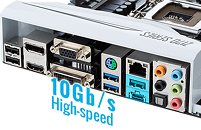Wednesday, June 22nd 2016

AMD "Zen" Processor Integrated Chipset Has USB 3.1 Issues, Could Escalate Costs
With its next-generation processors and APUs based on the "Zen" micro-architecture, AMD is integrating the chipset into the processor/APU die, making motherboards entirely chipset-free. This on-die chipset, however, is rumored to be facing issues with its integrated USB 3.1 controllers, according to industry sources. AMD sourced the design for the integrated USB 3.1 controllers from ASMedia. The company has a tendency of sourcing integrated controller IP from third-party manufacturers (eg: its SATA controllers and port-multipliers in the past have been sourced from Silicon Image).
Motherboard manufacturers are noticing significant drops in USB 3.1 bandwidths with increase in circuit distances (think wiring running from the AM4 socket to USB 3.1 front-panel headers on the bottom-right corner of a motherboard). Board designers are reportedly having to use additional retimer and redriver chips to get acceptable bandwidths over such ports, and in some cases even entire USB 3.1 controllers, eating into the platform's PCIe budget and escalating costs.AMD stated that the "Zen" processor platform is on-track, and the company will not comment on "customer specific board-level solutions." ASMedia played down the reports as industry rumors, and stated that its solutions passed the necessary certifications. The DigiTimes report adds that "AMD's Zen processors are seeing stable development and have a satisfactory yield rate, and about to enter the engineering sample stage in the near future."
Source:
DigiTimes
Motherboard manufacturers are noticing significant drops in USB 3.1 bandwidths with increase in circuit distances (think wiring running from the AM4 socket to USB 3.1 front-panel headers on the bottom-right corner of a motherboard). Board designers are reportedly having to use additional retimer and redriver chips to get acceptable bandwidths over such ports, and in some cases even entire USB 3.1 controllers, eating into the platform's PCIe budget and escalating costs.AMD stated that the "Zen" processor platform is on-track, and the company will not comment on "customer specific board-level solutions." ASMedia played down the reports as industry rumors, and stated that its solutions passed the necessary certifications. The DigiTimes report adds that "AMD's Zen processors are seeing stable development and have a satisfactory yield rate, and about to enter the engineering sample stage in the near future."

83 Comments on AMD "Zen" Processor Integrated Chipset Has USB 3.1 Issues, Could Escalate Costs
Should be easy to fix with a new revision, like Intel's Z68 B3 chipset back then.
Edit: At least they found the problem in time unlike Intel...
"USB 3.1 isn't perfect? Zen must be crap then"
Holy hell just wait for the release everyone has hardware bugs on new products Intel is no stranger nor is nvidia.
"We may have heard this, so let's make it a story for clickbait".
Like why would they not make it technically capable for steering on lets say 10 PCEe Lanes and then let the motherboard makers decide how many to actually physically put on the board?
And do we actually know if these "additional management capabilities are also not just part of the package but perhaps something you must activate in the bios or something?
Anyway, if someone wants to avoid "the poor man's option", he will find many reasons. On the other hand I remember reading about "the rich man's option" motherboards that where super loaded with features that you could not use because there weren't enough PCI express lanes.
As a games I don't care about remote management and as an office user I don't want to pay for 20 extra PCIe lanes that will go unused.
That's all.
The thing is, when you move something onto the CPU, the end user expects it will work pretty much the same, regardless of the motherboard choice. If in the end everyone decides to fix USB by adding those "additional retimers and redrivers", I still need to know to look after the quality of the implementation.
Personally, I don't care much as Zen will not be good enough for me to ditch my 6600k. It's just that I don't agree with posters saying this is business as usual and shouldn't be given any attention.
Also, for what we know, there is something physically wrong with the controller, because no other controller has been reported to have such issues. What ASMedia may be saying is that they delivered within the parameters specified by AMD. But we really don't know, so we should just watch for further developments.
Edit: Also, while my ancient case does not have a USB 3.1 panel, my brand new motherboard came with one. One Type-A and one Type-C no less. Though it did cost an arm a leg.
Lets face it ASMedia never been perfect anyways, like the SATA 3 running a max of 350Mb\s is pretty common.
This is disappointing to say the least, even for a rumor with no actual source.
HP just placed the chipset behind the USB ports and called it a day, others may follow suit.
Intel's USB3.1 solutions **HAVE THE SAME PROBLEM**
You just can't carry an 850MHz signal on motherboard traces for very far without picking up noise, so you have to boost (repeat) them to make longer distances. If the chipset is located too far away from the USB ports, then the performance will suffer or you need to use repeaters (which add a $2~5 to the cost).
Simple.
In this thread, what I am mostly seeing is people who have no idea how chip design is done, bashing on a company for reasons they do not understand.
That said, this is a problem, but it isn't a horrible one.